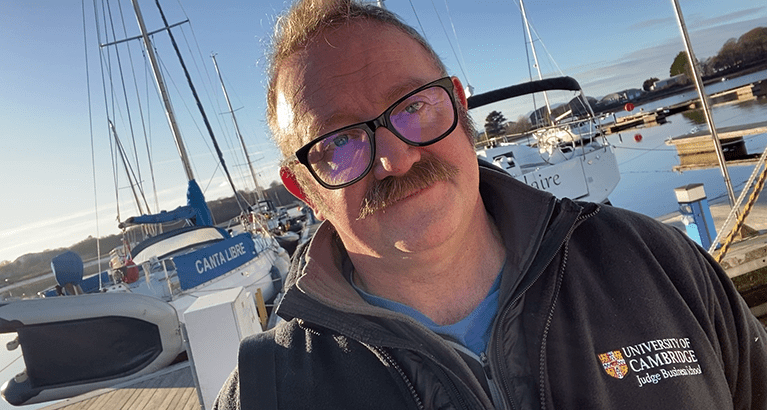With a bleak job landscape for MBA graduates post the 2007-2008 financial crisis, interest in environmental and sustainability topics was high, and a record number of students registered for the elective. Stephen comments, “I found it extremely amusing that, now that the world was ending financially – everyone felt that this was the end – they all wanted to save it.”
You cannot have a healthy financial economy on a sick planet
Believing that “the best way to persuade companies to go green is by influencing the next generation of business leaders”, Stephen started by stressing the need to establish a sound foundation for a healthy economy. He soon realised that hitting the class with hard facts wasn’t going to work: “That particular class taught me very powerfully that the assumption that an audience understands science or wants science or is moved by science is exactly that – an assumption. An assumption I was wrong to make because half of the class were turned off by it. If I tried to hit them over the head with more science, I was just losing the battle.”
Stephen resorted to less conventional teaching methods, including hiring a psychologist to lead a guided dream journey into the future as 45 students lay on the floor in one of the lecture theatres, and getting activists to fire up the class on the art of disruption.
Stephen didn’t pull any punches, admitting to deliberately provoking the students to press home the seriousness of the situation. As the elective drew to a close, he told the class, “This isn’t simply a course, a module for credit, this is a real, century-long emergency unfolding, and I want you to go away and change yourself and the world around you for the rest of your life. I want you to truly lead.” One student, speaking for the rest of the class, asked Stephen about his own lifestyle and what he would pledge to reduce his carbon footprint. After weighing up veganism or giving up flying, the 2 main slices of the personal carbon footprint, Stephen chose the latter.
Stephen admits, “For the first few years, I remember being quite miserable. I was giving up something I really loved. I did feel myself going through that Kübler-Ross grief cycle.” When he eventually came out the other end, he realised “I had to invent my own exotic, reinvent my own sense of adventure”.
You can find adventure and excitement on your doorstep
This began with family camping holidays, for example, going further north than they would otherwise have done. “I recall exploring parts of Scotland that I’d never been to before and going as far as Orkney – a fabulous, world-class destination. Its archaeological remains are outstanding but not necessarily on people’s bucket list, whereas Machu Picchu is.”
When Stephen was working on a documentary on the Isle of Eigg in the Hebrides, a chance encounter with a retired couple was the real gamechanger. They had a boat and were sailing round the British Isles. When the weather closed in or they had to get back home, they would moor the boat, but come back another day to continue their journey. “I was beguiled. I was absolutely captured and captivated. I’d never done any sailing; it had never crossed my mind. But it was a more sustainable way to get around and now I wondered what the UK would look like from a boat.”
Sailing became a big part of Stephen’s life, “a direct consequence of me not flying. I had changed my view of how I got that hit of exotic adventure”.
“Being out at sea in the middle of the English Channel or wherever it might be, in a storm, in the fog, just you and the elements – that’s when you find wilderness. Ironically, there are moments where I’ve found perhaps what a lot of people are looking for when they arrive at the airport. In the first instance, they’re looking for something. Well, I ended up finding it in the middle of the sea, feeling very alive and at the edge of life, experiencing every emotion.”
Stephen doesn’t regret his decision not to fly, acknowledging the tremendous benefits it has brought him, but appreciates that it’s not as easy for others to follow suit. “Others have less choice and have to fly for professional or family reasons. I feel blessed that flying is something I’ve managed not to do.”
Yet, undoubtedly, not flying has had a professional impact, although Stephen is reluctant to call it a ‘cost’. He has turned down countless invitations to international meetings, as well as other amazing opportunities, such as touring the Amazon Rainforest, trips to Cuba, the Middle East and China, to name just a few. “Of course, on one level, I would have loved to have done these things. Absolutely loved to. But I couldn’t. And I didn’t. And who knows where all that would have led. I’m looking forward to being able to fly once again, if and when planes are powered sustainably.”
You can grow by changing your habits
According to the International Energy Agency, in 2022, aviation accounted for 2% of direct global energy-related CO2 emissions, and Stephen adds that it contributes about 3-4% of overall global radiative forcing (global warming) when the indirect effects are taken into account. For those of us who fly, this will probably make up a significant portion of our personal carbon footprint since, mile for mile, flying is the most damaging way to travel for the climate. According to the University of Cambridge Sustainable Business Travel Guidelines, one return flight from London Heathrow to New York JFK emits around 2700 kg CO2e, which is equivalent to approximately half the average annual per capita emissions in the UK.
However, Stephen believes that the logic that an individual’s footprint is insignificantly small compared to the bigger picture and that it is consequently meaningless for us to make lifestyle changes simply leads to inaction. Furthermore, on a personal level, as we experiment with new habits and changes in our lives and to the mindset that drives us, we actually change ourselves.
Stephen continues, “This interplay between your impact on the external world, and your attempts to change that, and its impact on you personally, is the stuff of leadership and self-knowledge. It is the real work that we need to do in society to change our expectations about the balance between nature and culture. What is the natural cost of our cultural aspiration to have a certain lifestyle? That, in one sense, is what we’re talking about”.
The clock is ticking. And it’s now a few minutes to midnight. Stephen doesn’t have an answer to the question as to why we aren’t doing more. He agrees that the message communicated by climate scientists might have been acknowledged, but it’s not deeply heard. He returns to the class he taught back in 2008, when his aim was to build awareness in the next generation of business leaders. One student’s simple response was, “We don’t all think like you”.
We must minimise our environmental footprint for the planet and for businesses
Stephen says, “We’re interested in the future of the natural capital around us and the ability of the planet to hold some 8, 9, maybe 10 billion people, as well as our aspirations and footprints, because this is where we live and the base upon which business works.”
He concludes, “We need the skills for appreciating the natural world, but we also need to understand the interactions between business and the natural world, and between the models behind those businesses.”
Featured academic
Stephen Peake
Fellow (Economics and Policy)
In Lent term 2023, Stephen taught Environment and Sustainability on the Management Studies Tripos at Cambridge Judge. He is currently supervising on the MSt in Entrepreneurship at Cambridge Judge and on the Masters Programme at the Cambridge Institute for Sustainability Leadership.
Related content
What’s a tonne of carbon dioxide?
What’s a tonne of carbon dioxide to any of us? Well, it is both a tiny and a very large thing. Professor Stephen Peake, Fellow at Cambridge Judge Business School, talks about the environmental cost of a flight from London to New York.





